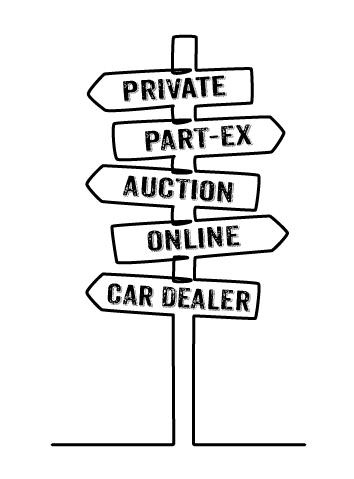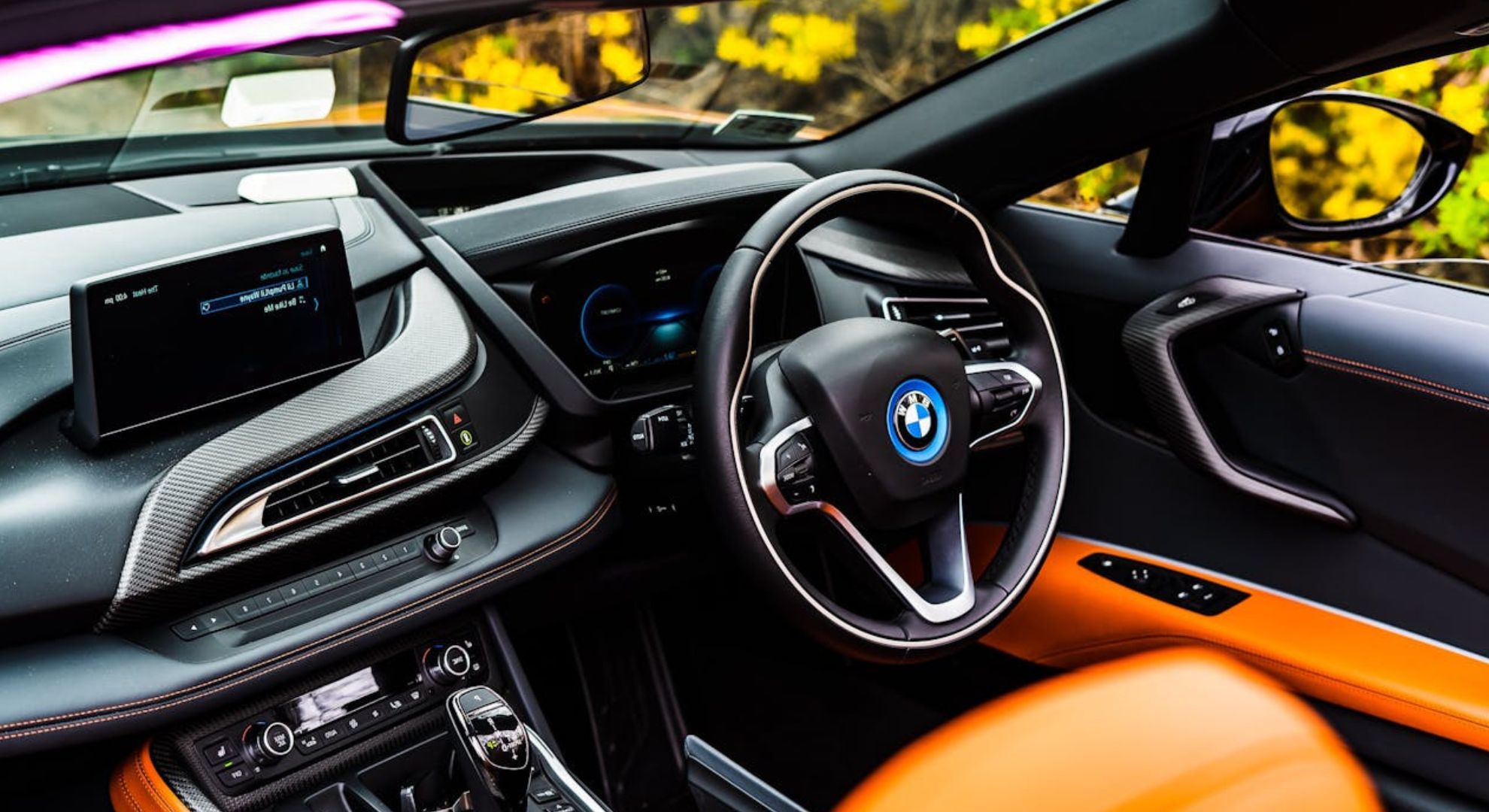Top tips for selling your car in 2025: Quick & easy tips
Selling your car might seem daunting, but it doesn’t have to be this way.
This guide is packed with actionable tips to help you sell like a pro, whether you prioritise ease, safety, or getting the best price.
Read on for expert advice to help you navigate the selling process with confidence.
Quick links:
- 1. Get a valuation for your car
- 2. Decide how to sell your car
- 3. Choose the right time to sell
- 4. Check the paperwork is in order
- 5. Clean your car
- 6. Check for and repair minor damage
- 7. Take your car for a service and renew the MOT
- 8. Delete your personal data
- 9. Create a listing with good quality photos
- 10. Manage viewings like a pro
- 11. Watch out for car buying scams
- 12. Stay safe during viewings and test drives
- 13. Negotiate a price you’re both happy with
- 14. Ensure you get paid
- 15. Get refunds for your insurance and road tax
- Other considerations
- Good luck – and happy selling!
Get a free valuation
1. Get a valuation for your car
No matter how you intend to sell your car, your first step should be to get a valuation. This will allow you to set a realistic asking price and gauge whether prospective buyers are making fair offers.
Enter your reg number and mileage into our free car valuation tool. Remember to provide details about your car’s condition and history to ensure an accurate quote.
Even if you don’t plan on selling immediately, getting a baseline valuation now, then revaluating your car in a few months can give you a clear picture of its depreciation path.
2. Decide how to sell your car
When it comes to car selling methods, there are several popular options at your disposal:
If you’re focused on maximising profit, it’s worth exploring selling your car privately. Just be prepared to make time in your schedule for viewings - and understand that success is not guaranteed.
Car buying services also offer a quick selling solution. If you sell to webuyanycar, you’ll benefit from a competitive price and a guaranteed sale. So, there’s no time wasted meeting viewers or dealers who aren’t serious about buying your car.
Dealerships offer a quick solution for drivers who want to get behind the wheel of a new car quickly. A part-exchange agreement allows you to put the value of your old car toward a newer model, but you could receive less money than you would with other selling methods.

3. Choose the right time to sell
Your car’s value may fluctuate at different times of year due to factors such as:
- Seasonality - Demand for different types of used cars varies throughout the year. For example, used convertibles sell well during the spring and summer, but fewer people buy them during the colder months. Therefore, you may get a better price for your convertible during the spring or summer when demand is higher.
- New number plate launches – New number plates launch twice a year in the UK – in March and September. This often has a positive knock-on effect for the used market. So, you could get a great price for your motor if you sell it around the time of a number plate launch.
4. Check the paperwork is in order
Make sure you have all the documents needed to sell your car including:
-
Your V5C logbook.
-
Your full service history.
-
MOT certificates.
-
Warranty documentation (if applicable).
Need to replace paperwork? Visit our guide to replacing lost car documents.
5. Clean your car
A grimy appearance can hurt the appeal of any car. So, if you want buyers to see your motor in the best possible light, give it a thorough clean inside and out.
You can use car shampoo with a bucket, sponge, and a little elbow grease to shine up the exterior. Then, de-clutter the interior and deep clean the upholstery.
If you want to achieve a showroom sheen, consider investing in professional detailing services.

Make your car shine! A clean vehicle boosts its appeal and helps attract buyers.
6. Check for and repair minor damage
Check for minor dents, scratches, and marks, as they can reduce your car’s resale value. A reputable body shop should be able to remove these small imperfections for a reasonable price.
Addressing these cosmetic issues should boost your car’s value and saleability.
7. Take your car for a service and renew the MOT
You should service your car at the intervals recommended by the manufacturer to maximise its lifespan and resale value. If your car’s next service is approaching, taking care of this before selling can reassure buyers that everything is in good working order.
Even more importantly, you should make sure your motor has a valid MOT. As a matter of courtesy, if you have less than six months’ cover remaining, you should get a fresh MOT. This will instil extra confidence in buyers that your car is free from major mechanical issues.
8. Delete your personal data
Don’t forget to remove any personal data from your car before you sell it. You should be able to do this by accessing the ‘Settings’ menu on your car’s infotainment system.
You should also break the link between your phone and the vehicle. Access the infotainment system and trigger the master reset key. Check the manual if necessary and ensure that access has been fully revoked before selling your motor.
9. Create a listing with good quality photos
If you plan to sell your car privately, we recommend taking high-quality photos for your adverts. Aim for a variety of interior and exterior shots, ideally taken in daylight.
Your photos should be accompanied by a concise, informative advert. Be honest about the car’s age, mileage, condition, and any faults. This will provide enough information for enquirers to contact you to arrange a viewing.

Take clear, high-quality interior and exterior photos to highlight your car's condition.
10. Manage viewings like a pro
When selling your car privately, it’s important to respond to any messages and phone calls in a professional and timely manner.
Record any scheduled viewings in your calendar. Aim to be punctual and keep your appointments. If you must cancel, give the viewer plenty of notice, and offer to reschedule.
11. Watch out for car buying scams
Private car selling carries a higher level of risk, so it’s important to be vigilant. Here are some of the most prevalent car buying scams:
- You may get a response to your ad from someone who claims to have found a buyer. They’ll offer to introduce you in exchange for a ‘finder’s fee’, only to cut all contact once you’ve paid them.
- Be wary of requests to pay with less secure methods, such as PayPal, a digital wallet app, or wire transfer. After buying your car, a scammer may dispute the transaction, potentially leaving you without your car and the cash.
- If you’ve listed your motor on a car advertising website, screen any users before engaging with them. If they signed up an hour ago just to pester you to sell to them, treat this with suspicion!
12. Stay safe during viewings and test drives
If you’re selling your motor on the private market, you’ll have to facilitate viewings and, in many cases, test drives. We recommend asking a friend or family member to accompany you when meeting viewers to ensure everything goes smoothly.
Meet viewers at a familiar location, away from your home address. Be wary of requests to meet at a remote spot. This tactic is often used to steal cars by force.
Before allowing someone to test drive your car, make sure they have a valid driving licence and insurance. If they don’t, offer to demonstrate the car on their behalf.
13. Negotiate a price you’re both happy with
When negotiating with a buyer, start with your maximum price, but show a willingness to lower your offer – and try to meet them in the middle. If the buyer feels that they have haggled a discount, they are more likely to accept your offer.

14. Ensure you get paid
No matter how you choose to sell your car, it’s important to get paid promptly and securely:
- If you’re selling privately, request a secure payment method such as a bank transfer, CHAPS payment, or escrow. Cash payment is also straightforward, but you should arrange to meet the buyer at the bank and ask the teller to count and verify the money.
- Most dealerships will arrange payment by bank transfer.
- If you sell to webuyanycar, we’ll pay you by bank transfer within four working days if you choose our Standard Payment option. Want to get paid faster? Select our Immediate Payment option to get paid within 15 minutes. (Additional fees apply.)
15. Get refunds for your insurance and road tax
If you have outstanding cover on your car’s insurance policy when you sell it, you should be able to claim a partial refund. The amount you can claim will depend on how long you have left on the policy and the terms and conditions set by your provider.
It is your legal responsibility to notify the DVLA after selling your car (and by failing to do so, you risk incurring a £1,000 penalty). If there are any full months’ car tax remaining, you can also claim a car tax refund through the DVLA.
Other considerations
-
Before selling a car with outstanding finance, you’ll need to settle the balance with the lender. Looking for a hassle-free solution? webuyanycar can settle the finance on your behalf. You’ll just need to provide us with an in-date settlement letter from the lender.
-
Aim to be as transparent as possible. Describe your car accurately in your ads and answer questions honestly. This will reduce the risk of legal complications if your car later develops faults.
-
If you’re selling a car with an intact warranty or a servicing package, contact the provider(s) to notify them of the ownership change and ensure it is transferred to the new owner.
Good luck – and happy selling!
We hope you found our guide helpful. While some aspects of car selling can be tricky, our tips and strategies are here to help you navigate the market and get the sale you want.
Remember, if one method doesn’t get the right results, you can always try another. We wish you every success on your car selling journey!
Quick links:
- 1. Get a valuation for your car
- 2. Decide how to sell your car
- 3. Choose the right time to sell
- 4. Check the paperwork is in order
- 5. Clean your car
- 6. Check for and repair minor damage
- 7. Take your car for a service and renew the MOT
- 8. Delete your personal data
- 9. Create a listing with good quality photos
- 10. Manage viewings like a pro
- 11. Watch out for car buying scams
- 12. Stay safe during viewings and test drives
- 13. Negotiate a price you’re both happy with
- 14. Ensure you get paid
- 15. Get refunds for your insurance and road tax
- Other considerations
- Good luck – and happy selling!







